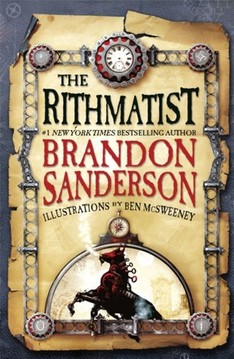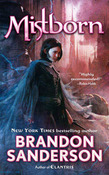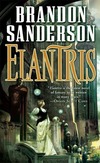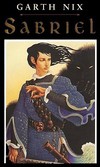
Sorry, Brandon Sanderson -- I've loved everything else of yours that I've read, but this one couldn't even inspire me to finish it.
And that's despite the fact that it's a middle-grade* novel that would only take a couple hours of dedicated reading to get through.
On paper (this is secretly a pun, because it has a drawing-based magic system), this book should have been awesome. An academy setting, fascinating alternate-history worldbuilding, and a Brandon Sanderson Magic System (TM)? What's not to love?
And that's despite the fact that it's a middle-grade* novel that would only take a couple hours of dedicated reading to get through.
On paper (this is secretly a pun, because it has a drawing-based magic system), this book should have been awesome. An academy setting, fascinating alternate-history worldbuilding, and a Brandon Sanderson Magic System (TM)? What's not to love?
The story revolves around Joel, a kid attending a Super Prestigious Academy (SPA) that happens to specialize in chalk magic (Rithmatics). Except that Joel can't do any chalk magic. He shouldn't even be at this SPA -- his grades are sub-par, and his family certainly can't afford it -- but his mother works as a cleaner and his (dead) father used to be buds with the headmaster. So, good education for no tuition! Good deal, right?
Not really, because Joel doesn't care about anything except for Rithmatics -- the one subject he's really not allowed to study. He does anyway, of course, but he has to jump through various red-tape hoops to do it.
Meanwhile, the actual Rithmatics students (the ones who can, y'know, do the chalk magic) are being attacked by some Mysterious Bad Guy (MBG) using -- did you guess it? -- chalk magic. Which is somehow crazily different from the chalk magic the other Rithmatists can use, but since we (the readers) don't really have a firm grasp on this shiny new magic system, it isn't entirely clear how this crazily-different chalk magic is so, well, crazily different.
The way the magic is explained to the readers is pretty cool, though -- diagrams between chapters of different kinds of lines and strategies the Rithmatists can use. The downside of this, though, is the same downside as with any textbook "figure 1" teaching method: it's just data. The reader (or at least I) won't be able to recognize and understand the terminology unless I hear it in dialogue -- and, in my mind, knowing the different names for all the defensive vs. offensive configurations a Rithmatist might hypothetically use isn't so useful when I need to flip through the pages every time one of the characters mentions it.
Not to give this clumsy (and outright gimicky) exposition style undue attention; I have plenty of complaints about the rest of the book, too.
The characters are all flat and predictable -- naively enthused protagonist, irritable and artsy female foil, endearingly-cluttered professor mentor, snidely aloof professor red herring, militant investigator... Not a one is all that memorable. The mystery element might be intriguing, if readers had any reason at all to care about the Rithmatists-in-training who have been killed, or about any of those at risk of being targeted next, but none of them is shown in any detail. Our protagonist, in fact, is notable mainly because he doesn't fit the killer's profile -- not very conducive to raising the tension.
The one highlight of the book is, as in so many of Sanderson's books, the worldbuilding. Both the altered history and the magic system itself have heaps of intriguing potential -- but not nearly enough to get me to keep reading when none of the other elements inspire anything but yawns.
So I'm throwing in the towel. One star, and I'm clearing it from my currently-reading shelf. Better luck next time.
Not really, because Joel doesn't care about anything except for Rithmatics -- the one subject he's really not allowed to study. He does anyway, of course, but he has to jump through various red-tape hoops to do it.
Meanwhile, the actual Rithmatics students (the ones who can, y'know, do the chalk magic) are being attacked by some Mysterious Bad Guy (MBG) using -- did you guess it? -- chalk magic. Which is somehow crazily different from the chalk magic the other Rithmatists can use, but since we (the readers) don't really have a firm grasp on this shiny new magic system, it isn't entirely clear how this crazily-different chalk magic is so, well, crazily different.
The way the magic is explained to the readers is pretty cool, though -- diagrams between chapters of different kinds of lines and strategies the Rithmatists can use. The downside of this, though, is the same downside as with any textbook "figure 1" teaching method: it's just data. The reader (or at least I) won't be able to recognize and understand the terminology unless I hear it in dialogue -- and, in my mind, knowing the different names for all the defensive vs. offensive configurations a Rithmatist might hypothetically use isn't so useful when I need to flip through the pages every time one of the characters mentions it.
Not to give this clumsy (and outright gimicky) exposition style undue attention; I have plenty of complaints about the rest of the book, too.
The characters are all flat and predictable -- naively enthused protagonist, irritable and artsy female foil, endearingly-cluttered professor mentor, snidely aloof professor red herring, militant investigator... Not a one is all that memorable. The mystery element might be intriguing, if readers had any reason at all to care about the Rithmatists-in-training who have been killed, or about any of those at risk of being targeted next, but none of them is shown in any detail. Our protagonist, in fact, is notable mainly because he doesn't fit the killer's profile -- not very conducive to raising the tension.
The one highlight of the book is, as in so many of Sanderson's books, the worldbuilding. Both the altered history and the magic system itself have heaps of intriguing potential -- but not nearly enough to get me to keep reading when none of the other elements inspire anything but yawns.
So I'm throwing in the towel. One star, and I'm clearing it from my currently-reading shelf. Better luck next time.
* I consider this book middle-grade, despite its marketing as YA, because there's really nothing even remotely teenagerly about it -- no hormones, no feel of being on the brink of adulthood. Without any of those themes, there's no reason for it to be any less appropriate for a ten-year-old than for a member of the supposedly-intended age group.
Recommendations:
Well, I didn't like this one so much, so here's what I think you should consider reading instead:

Mistborn, by Brandon Sanderson
This is a far superior novel by this author, and in my opinion it's closer to being YA than The Rithmatist
came, too. Really fantastic and flawed protagonist, fascinating plot, and solidly intriguing premise.

Elantris, by Brandon Sanderson
Another superior novel by this author. This one has a vaguely similar magic system to The Rithmatist, though I
feel like it's introduced more effectively (and digestibly)
than the chalk system is. Well-done trifold narration,
and some nice political intrigue to tie it together.

Sabriel, by Garth Nix
For a great young-YA story with fabulous
alternate-history worldbuilding and an exciting
magic system, Sabriel is a definite go-to: in other
words, everything The Rithmatist simply wasn't.

 RSS Feed
RSS Feed





